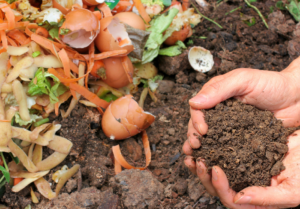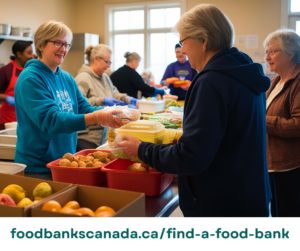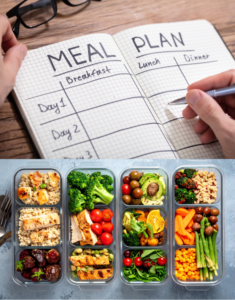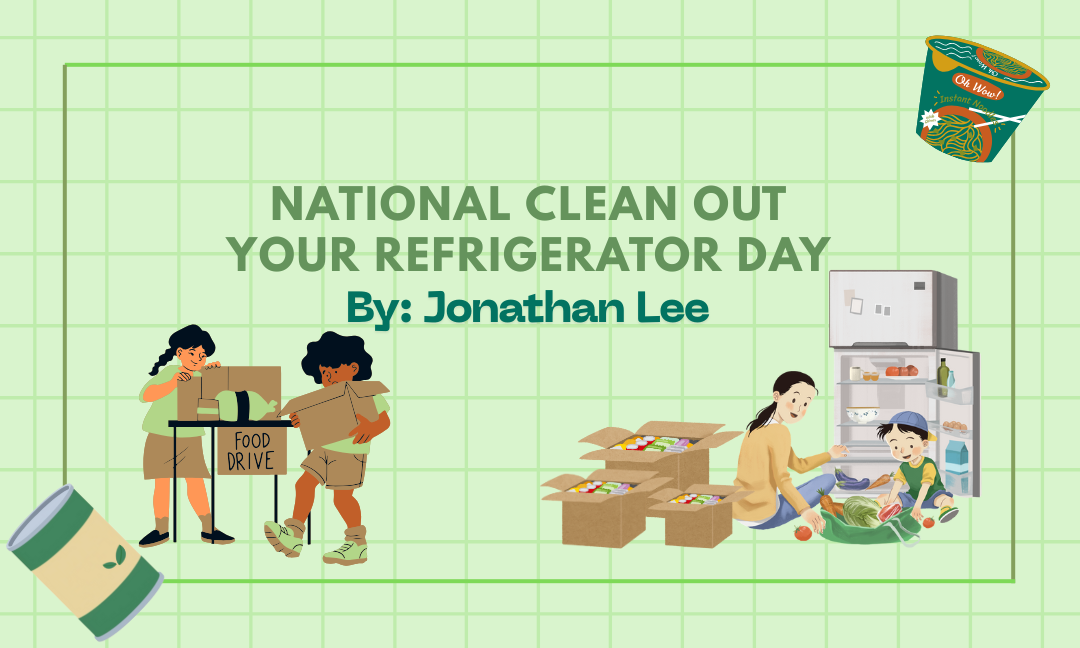Written by: Jonathan Lee
Edited by: Declan Murphy
Designed by: Jedrick Asuncion
Allegedly created by American home economists at the Whirlpool Corporation in 1999, National Clean Out Your Refrigerator Day was originally meant as a way to remind customers to clean out their fridges before the upcoming holidays, especially Christmas, being around the corner. To celebrate some top tips on dealing with your food wastage not just within your household, but in your local community.
Tip #1 – Composting your food!
Sure, composting food sounds like a daunting project at first, but it’s actually way simpler than one might expect, as well as being an eco-friendly way to manage your food waste. Start by lining a compost bin with a layer of soil, before mixing both carbon-rich waste (browns, such as cardboard, wood waste, or pieces scrap paper) and nitrogen-rich waste (greens, such as unwanted fruit and vegetables, eggshells and grass clippings) into the compost bin, aiming for a ratio of around 1 part green waste to 3-4 parts of brown waste. Make sure to mix your compost every few weeks, and sit back and let the microorganisms in the soil get to work!
Why this helps: By composting your organic waste, not only are you helping alleviate the burden on our quickly overflowing landfills, you’re also creating some quality nutrient-rich soil for your next gardening project.

Tip #2 – Donate to a Food Bank!
If you’ve got non-perishable and shelf stable food (food that can be stored at room temperature without spoiling), perhaps consider a donation to your local food bank instead. With Food Banks Canada’s ‘Find a Food Bank’, you can quickly and easily locate a food bank near you. You’ll be able to donate food to those in need, as well as clear up space in your fridge.
Why this helps: Donating to a food bank is more than just simple charity work, as it helps distribute the food to those who need it most. Visit https://foodbankscanada.ca/find-a-food-bank/

Tip #3 – Run a Food Drive!
Instead of simply donating your own food to a food bank, why not make it a community effort and run a food drive instead by collecting food from your local neighbourhood or school via a food drive? Not only are you saving food that’d otherwise be wasted, you’ll be able to get your local community to band together for a worthwhile cause.
‘But sure, that’s all well and fine,’ you might be thinking, ‘but how can I reduce the food waste I generate in the first place?’ Don’t worry, we’ve got you covered for that too!
Here are three more tips, this time on how to reduce food waste in your household!
 Tip #1 – Create a Meal Plan for Groceries
Tip #1 – Create a Meal Plan for Groceries
A lot of food wastage comes from the fact that we often over-estimate the amount of food and groceries we need, and as a result, we overbuy, resulting in food that piles up in our refrigerators without being eaten. To circumvent this issue, forming a weekly food plan can streamline grocery shopping, ensuring that you only buy what you need for the week. This can also be really helpful if you’re trying to stick to a particular diet, as it eliminates the temptation of snacks or extra food.
Tip #2 – Purchase imperfect produce
A lot of fruit and vegetables in markets go unsold due to looking misshapen or, in other words, ugly. However, contrary to popular belief, these are actually perfectly edible, and in fact contain just as much nutritional value as their better looking counterparts. If their appearance puts you off though, you could always dump them in a soup, or blend them into a healthy smoothie
Tip #3 – Repurpose unused parts of food
Sometimes, reducing food waste is as simple as repurposing those leftover parts of food you were going to throw away into other tasty recipes. Those leftover meat bones after preparing dinner? Boil ‘em and add some vegetables to make a nice, hearty bone broth. Got some watermelon rinds left after a party? Chop them into chunks and pickle them in brine, and they’ll make a nice snack.
Conclusion:
This Clean Out Your Refrigerator Day, why not take things a step further and tackle the issue of food wastage not merely by emptying out your fridge, but by tackling food waste in your household and local community instead? Food waste remains a significant issue in Canada as well as around the world, with an estimated 2.5 billion tonnes of edible food being lost or wasted each year. Every action counts, no matter how small, and it can just be as simple as making a smoothie!
Sources
https://www.epa.gov/recycle/composting-home
https://www.thespruce.com/composting-greens-and-browns-2539485
https://www.epa.gov/recycle/preventing-wasted-food-home
https://zerowastechef.com/2018/05/02/15-creative-uses-food-scraps/
https://madeinca.ca/food-waste-canada-statistics/

